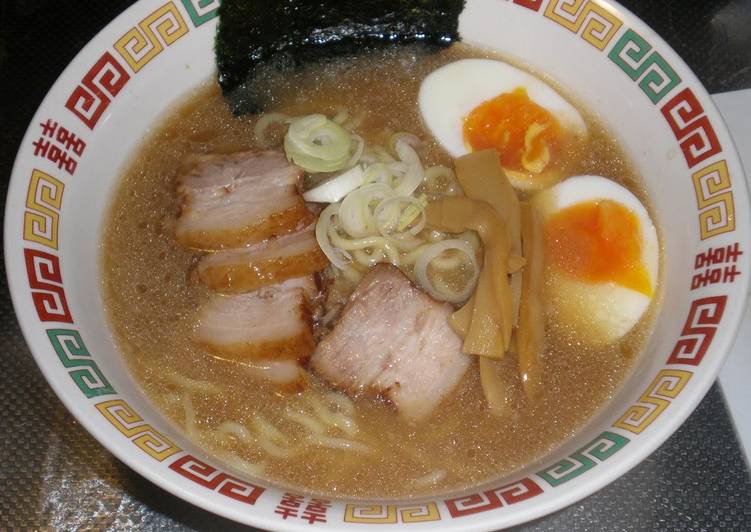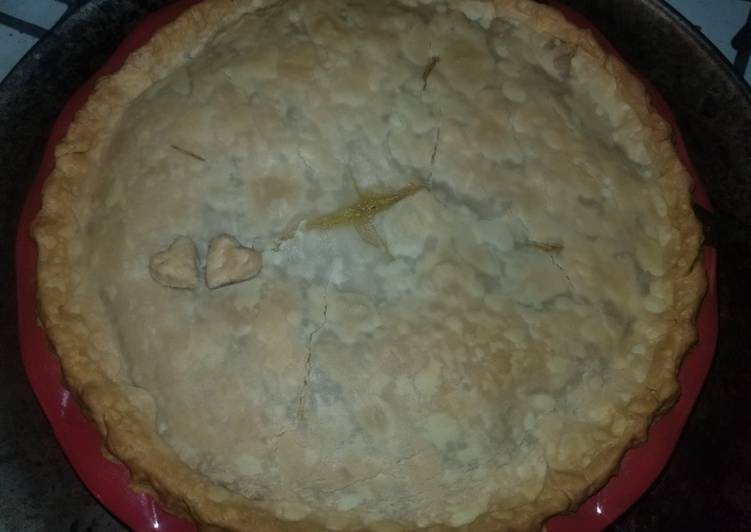
Hello everybody, it is Jim, welcome to our recipe page. Today, I will show you a way to prepare a special dish, homemade tonkotsu ramen broth and noodles from scratch. One of my favorites. For mine, I will make it a bit tasty. This is gonna smell and look delicious.
Homemade Tonkotsu Ramen Broth and Noodles from Scratch is one of the most popular of recent trending meals in the world. It is easy, it is fast, it tastes delicious. It is enjoyed by millions daily. They are fine and they look wonderful. Homemade Tonkotsu Ramen Broth and Noodles from Scratch is something that I’ve loved my entire life.
Great recipe for Homemade Tonkotsu Ramen Broth and Noodles from Scratch. How about trying this on your day off? I recommend you try this when you have plenty of time on.
To begin with this recipe, we must first prepare a few components. You can cook homemade tonkotsu ramen broth and noodles from scratch using 19 ingredients and 25 steps. Here is how you can achieve that.
The ingredients needed to make Homemade Tonkotsu Ramen Broth and Noodles from Scratch:
- Prepare Soup
- Prepare 5 bones Pork on the bone
- Make ready 2 Japanese leek
- Make ready 2 medium Onions
- Prepare 1 tsp Grated ginger (tube is fine)
- Get 1 tsp Grated garlic (tube is fine)
- Prepare 100 grams Pork fatback
- Make ready 1 enough to fill a large pot Water
- Prepare Noodles
- Get 500 grams All-purpose (medium) flour
- Prepare 1 -5 1/2 grams Powdered kansui (alkaline minerals)
- Prepare 200 ml Water
- Prepare 1 for dusting Katakuriko
- Take Char siu (Chinese-style roasted pork)
- Make ready 500 grams Thinly sliced pork belly
- Get 50 ml Soy sauce
- Make ready 50 ml Mirin
- Prepare 1 tbsp Sugar
- Get 500 ml Water
Tonkotsu ramen broth is made up of the tonkotsu stock and dashi. Many people (including myself!) use the terms stock and broth interchangeably but they are actually two different things. Good ramen requires a few things. But the difference between good ramen and great ramen is the broth.
Steps to make Homemade Tonkotsu Ramen Broth and Noodles from Scratch:
- I got these pork bones at the supermarket (they were being sold for about 15-30 yen per 100 g in my neighborhood). I think about 5 bones come out to 3 kg.
- Wash off the blood under running water. Place the bones in a large pot of cold water. Bring the pot to a boil (at this point, the bones will be giving off a very strong odor, but don't worry).
- A lot of scum will come to the surface. Scoop it out diligently (I know this part is a bit off-putting, but stick with it. It'll turn out okay).
- Strain in a colander and remove the remaining blood from the bones with a scrubbing brush.
- Use a saw to make a slice in middle of the bones, and a hammer to break them in half. (It's easier if you make an incision before snapping them).
- Look at all the bone marrow inside the bones. We'll be melting it out by simmering these bones over a long period of time.
- Now start to add the other ingredients for the soup. Diligently remove the scum that rises to the top. Keep the heat at medium and maintain a gentle boil.
- Once the scum has been removed, simmer the broth for another 6 hours. Add more water if it boils off.
- Next we'll be preparing the noodles. Measure out the ingredients and mix the flour and powdered kansui together. Add the water. It'll feel like a very small amount of water, but don't worry.
- Mix the ingredients until the dough starts to clump together in the bowl.
- The dough is a pretty tough one, so be careful not to hurt your wrists. Try mixing it with the weight of your body.
- Move the dough to a working surface and knead. Don't worry too much about cracks or inconsistencies yet. Just knead for about 10 minutes.
- Round up into a ball, wrap with plastic cling wrap, and let sit in the refrigerator (for at least 30 minutes. Then check if the dough has settled).
- Prepare the char siu in the meantime. Brown the meat in a frying pan, and simmer for 2 hours in a pot with the combined seasoning ingredients. Let cool in the pot.
- Once the dough has become moist, roll out to a thickness of 5 mm. Use a pasta machine to even it out to your desired thickness.
- If you don't have a pasta machine, just use a rolling pin to stretch out the dough (but remember that the dough will thicken up about 1.3 times, so include that in your calculations).
- You can manage with just a little bit of dusting flour (katakuriko or bread flour) since the dough isn't that sticky.
- Apparently a wooden box is best for storing Chinese noodles, but if you don't have one on hand, just transfer them to a tray lined with parchment paper. Insert tray in a plastic bag and keep cool in the refrigerator.
- About two hours after simmering the broth, it'll start to get white and cloudy. I wouldn't taste testing it just yet, since it'll still be somewhat smelly.
- Here's what the broth should look like after 6 hours of simmering. The marrow has melted out of the bones, which have emptied out. The soup now looks quite rich and smells like it should (just like what you get a ramen joint).
- The char siu should have become a caramel brown. Take care not to break it apart when you're slicing the meat, since it'll be quite soft at this point.
- Enjoy the leftovers with a cold beer!
- Now that you have everything prepared, get ready to make your ramen. Boil each serving of noodles separately and adjust the times carefully by watching over them. If you'd like your noodles rippled, squeeze the noodles once and fluff them out again before boiling.
- Warm up the bowl you'll be using for the ramen. Add the simmering sauce you used for the char siu and season with some salt (starting on the lighter side so the taste is easier to adjust) and pour in the pork broth you prepared earlier.
- The boiling time for the noodles should be about 1:30-2 minutes, but this is something you can change according to your preferences. Once you add your noodles to the soup and garnish with your desired toppings, your rich and creamy tonkotsu ramen is complete.
You can make due with store bought noodles, and maybe you only have a minimal fixings to add. All of that can be suffered through as long as you make a good broth. I season my tonkotsu ramen with salt, chashu sauce, soy sauce, garlic and shallot oil and sesame oil. You can flavor your broth however you like it. Back home that evening, I added dried shiitake mushrooms, kombu (kelp), and bonito (fish flakes) to some boiling chicken broth.
So that is going to wrap this up with this special food homemade tonkotsu ramen broth and noodles from scratch recipe. Thanks so much for reading. I’m confident you will make this at home. There is gonna be more interesting food at home recipes coming up. Remember to save this page in your browser, and share it to your loved ones, friends and colleague. Thank you for reading. Go on get cooking!


